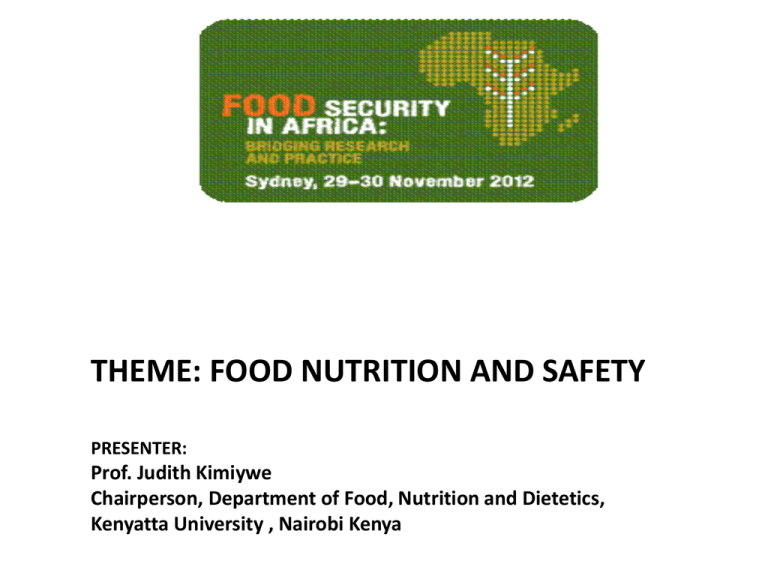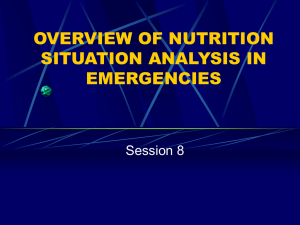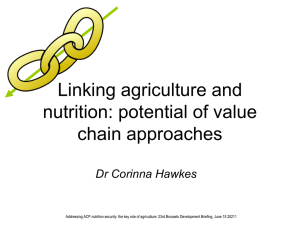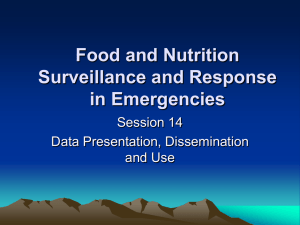The 11 High Impact Nutrition Interventions for Kenya
advertisement

THEME: FOOD NUTRITION AND SAFETY PRESENTER: Prof. Judith Kimiywe Chairperson, Department of Food, Nutrition and Dietetics, Kenyatta University , Nairobi Kenya The Magnitude and Severity of the chronic malnutrition situation in Kenya • Over 10 million people in Kenya suffer from chronic food insecurity and poor nutrition. • 2-4 million people require emergency food assistance at any given time. • Nearly 30% of Kenya’s children are undernourished with 35% stunted. • Micronutrient deficiencies (iron, vitamin A, Zinc and iodine ) are widespread, with emerging rise in rickets. Impact: Sustained high rate of stunting adversely affects human capital and economic progress 0.8% GDP lost due to vitamin and mineral deficiencies (UNICEF & MI, 2004) Double Burden of Malnutrition: Overweight and Obesity Kenya facing increased cases of new and emerging conditions and diseases known as non- communicable diseases (NCDs) Hypertension, Diabetes, Cancer, Cardiovascular diseases due to a rise in Overweight and Obesity (40% in women and 22% in children) Causes: Shift to increased consumption of highly refined foods with added Sugars, Salts & Fats and Shift to reduced physical activity and sedentary lifestyle Impact: Early and premature deaths, Increased health care costs at national and household level, No savings for investment and poverty circle continues 1000 days- The 11 High Impact Nutrition Interventions for Kenya • • • • • • • • Exclusive breastfeeding, Complementary feeding Hand washing Iron folate supplementation Vitamin A supplementation Deworming Multiple micronutrient supplementation Salt iodization • Zinc supplements for management of diarrhoea • Food fortification of local staples • Prevention and treatment of malnutrition ( moderate and severe acute forms) Proven cost-effective interventions to reverse malnutrition trends Policy Environment for Nutrition Improvement: The National Food and Nutrition Security Policy This policy provides a close link between food and nutrition hence key role of agriculture sector Objectives of the NFNSP: • To achieve good nutrition for optimum health of all Kenyans. • To increase the quantity and quality of food available, accessible and affordable to all Kenyans at all times. • To protect vulnerable populations using innovative and costeffective safety nets linked to long-term development. Key priority areas for the NFNSP • Food availability and access • Food safety, standards and quality control • Nutrition improvement and nutrition security • School nutrition and nutrition awareness • School nutrition and nutrition awareness • Food and nutrition security information • Early warning and emergency management • Institutional and Implementation framework Calls for high level government commitment KENYA NATIONAL NUTRITION ACTION PLAN 2012- 2017-Key Priority Areas • • • • • To improve the nutritional status of women of reproductive age (15-49 years) To improve the nutritional status of children under 5 years of age To reduce the prevalence of micronutrient deficiencies in the population To prevent deterioration of nutritional status and save lives of vulnerable groups in emergencies To improve access to quality curative nutrition services • To improve prevention, management and control of diet related Non Communicable Diseases (NCDs) • To improve nutrition in schools, public and private institutions • To improve nutrition knowledge attitudes and practices among the population • To strengthen the nutrition surveillance, monitoring and evaluation systems • To enhance evidence-based decision-making through research • To Strengthen coordination and partnerships among the key nutrition actors Potential to achieving Nutrition Goals Guiding Documents • Kenya Vision 2030 • Kenya National Health Sector Strategic plan • National Food and Nutrition Security policy • National Nutrition Action Plan • At global level The MDGs and Scaling Up Nutrition framework for action Guiding Principles The Constitution of Kenya 2010 • 43 (1 ) (C) Every person has the right to be free from hunger and to have adequate food of acceptable quality • 53(1) (C) Every child has the right to basic nutrition ,shelter and health care Acknowledgements • Presentation is based on data contained in the DRAFT Paper on Reducing Chronic Malnutrition in Kenya: A Situation Analysis and Recommendation for a multisectoral response by;Emily Levitt Ruppert, Ziauddin Hyder, Terry Wefwafwa, Huihui Wang, John Newman • • • • The Government of Kenya reports The ministry of Public Health and Sanitation The Ministry of Agriculture Data from the development partners (UNICEF, WHO, World Bank, USAID, GAIN, MI, WFP, World Vision) Insert Logo Thank you






